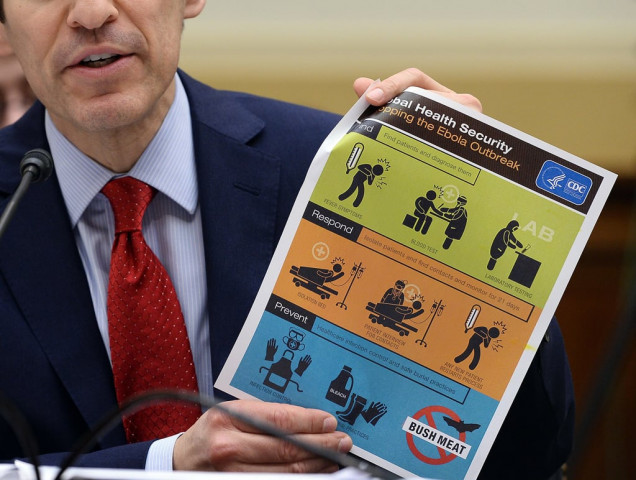The Ebola crisis
It is not inconceivable that Ebola could find its way to Pakistan and the country would be poorly placed to treat it.


Thus far, all the cases have been reported in the African continent (there are a handful of cases being treated in Western countries today, mostly health workers who have contracted the disease), but there is recognition that Ebola may make a breakout and travel elsewhere in the world. The WHO has now recommended exit screening for all people, who are flying out of affected countries, which may be a helpful move, but does nothing to prevent or monitor the movements of people across unmarked and remote borders in places that are far from the eyes of an anxious world. So far, the WHO has refrained from calling for global travel restrictions and has asked airlines to take the strictest of precautions when flying in and out of affected countries.
The US health authorities have sounded an even more ominous note, saying that the spread of Ebola beyond west Africa was now inevitable, and the charity Medecins sans Frontieres has also said that the virus is now “out of control” and that there were more than 60 outbreak hotspots spread across thousands of miles.
Ebola is not a ‘mystery disease’. It is well-documented and researched, but there is as yet, no vaccine to treat it, in part because the numbers affected were so small and outbreaks in relative terms so rare, that it has not been economically worthwhile for pharmaceutical companies to develop a vaccine. That may be changing and trials are in train of an experimental vaccine in the US. That said, there have been no blind trials using a placebo to determine the efficacy of the experimental drug, and pharmaceutically, the world is in Terra Incognita.
Placing the outbreak in context, so far less than a thousand have died and between 50 and 60 per cent of those infected are recovering due to effective nursing methods, largely palliative and preventative. Compared with diseases like tuberculosis, Ebola is a bit-player in terms of global afflictions. It can be contained with the use of appropriate medical equipment, good training and robust indigenous health systems, all present in developed states, rare in Africa generally. There is agreement that if Ebola ever did make the jump to the developed world, it would be quickly contained and treated, and a mass casualty event is unlikely. The current outbreak is likely to get worse before it gets better and could last into the spring of 2015.
All this may seem over the event horizon for Pakistan healthcare planners. Not so. As evidenced by the failure to eradicate or contain polio and the burgeoning tuberculosis crisis, Pakistan’s health infrastructure is anything but robust or effective and responds poorly to emergencies — this year’s dengue and measles outbreaks being a case in point.
Hypothetical as it may be, it is not inconceivable that Ebola could find its way to Pakistan via migrant workers and the country would be poorly placed to identify and contain or treat it. Ebola is passed via contact with bodily fluids, and in a nation with extremely poor personal hygiene in many areas, polluted water supplies and a widespread absence of latrines, coupled with open-field defecation, it could be argued that an accident is waiting to happen. It is to be hoped that it never will, but at the very least, Pakistan’s health planners need to be on a heightened state of alert. Forewarned is forearmed.
Published in The Express Tribune, August 11th, 2014.
Like Opinion & Editorial on Facebook, follow @ETOpEd on Twitter to receive all updates on all our daily pieces.



















COMMENTS
Comments are moderated and generally will be posted if they are on-topic and not abusive.
For more information, please see our Comments FAQ